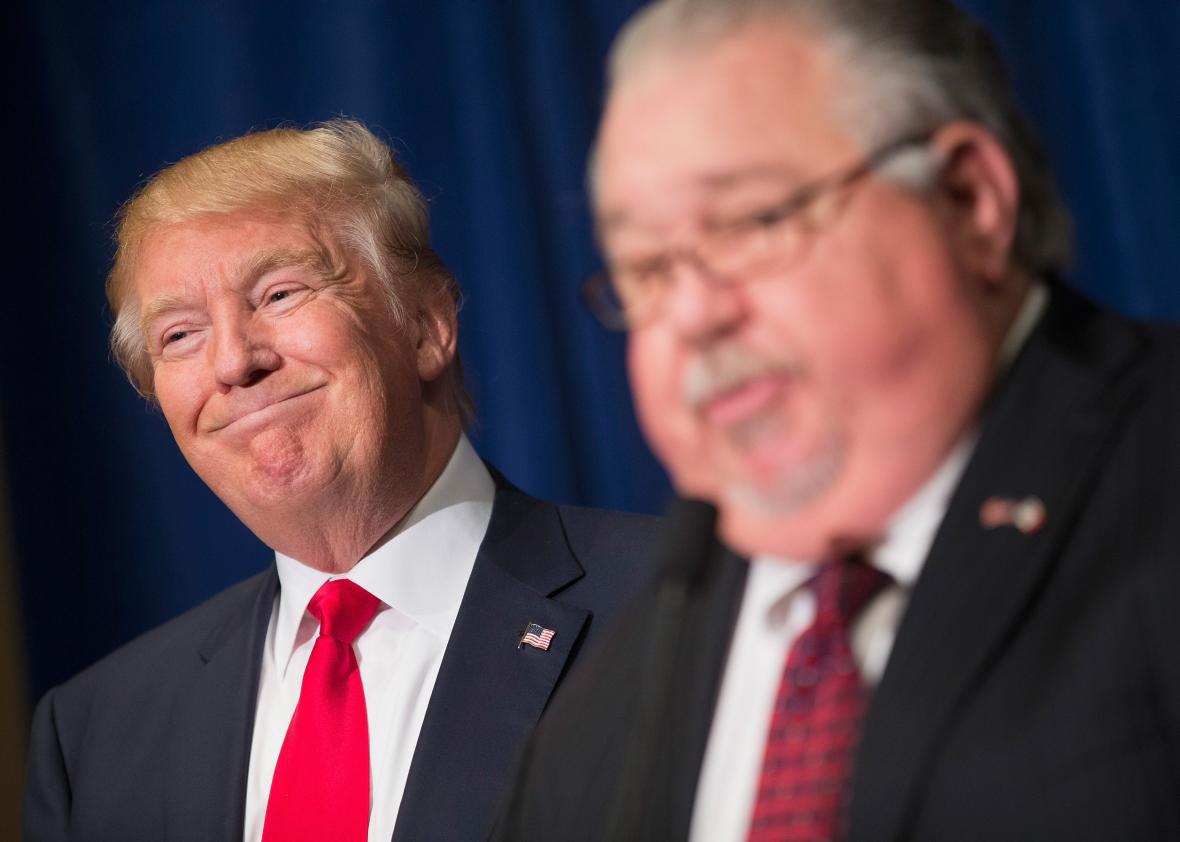Over the past 50 years, the U.S. standard of living has benefited dramatically from active and open government support of scientific inquiry. But three unrelated recent news stories, two out of Washington and one from China, together strike an ominous warning about a very different future.
In Washington, President Trump nominated talk radio host Sam Clovis to occupy the Department of Agriculture’s top science post—undersecretary for research, education, and economics. The position involves overseeing a budget of $2 billion for research and $1 billion for education. Clovis has no scientific training, but he does have a long history of denying the science demonstrating the reality of climate change.
Want to listen to this article out loud? Hear it on Slate Voice.
Meanwhile, Joel Clement—who as director of the Department of the Interior’s Office of Policy Analysis oversaw such things as helping endangered communities in Alaska prepare for and adapt to climate change—blew the whistle the Washington Post about goings-on in his corner of the government. Clement writes that he was one of 50 senior employees reassigned to unrelated jobs. Clement, a scientist and policy expert, was shuffled into an accounting job in the office that collects royalty checks from fossil fuel companies. Clement had previously spoken publicly about the dangers of climate change in Alaska, and as he discusses in his Washington Post op-ed, he has filed a whistleblower complaint arguing the reassignment was retaliation against him for his speaking out publicly about possible impacts of global warming.
Finally, out of Beijing comes the story that China has created a development plan to become the world leader in A.I. by 2030. It hopes to “build a domestic industry worth almost $150 billion,” according to the New York Times. This comes at the same time as the Trump administration has proposed severe cutbacks in various government agencies that traditionally support A.I. research, and in high-performance computing that is an essential ingredient in much A.I. work. While it is impossible to predict what breakthroughs will come from this research, A.I. is likely to have a dramatic impact upon the future world economy, much as the internet has had over the past 25 years, and the development of transistors 25 years before that.
Muting or censoring government scientists, appointing unqualified senior government officials to scientific posts, and underfunding scientific research programs are all part of an insidious and worrisome trend. It is insidious because the impacts of such decisions are not immediate. Rather, they will affect the health and welfare of the country a generation from now.
Government should rely on the best and brightest to provide advice and leadership of the nation’s technological base. Government scientists who enter into public service could often gain significantly higher incomes by remaining in the private sector. But instead they help develop a national infrastructure that raises the economic tide for everyone. Or they provide crucial advice that helps direct government resources to support research that may result in significant breakthroughs, eventually aiding the nation and the world.
Instead, existing government scientists are leaving their posts and potential new young scientists will almost surely becoming disenchanted. As a result, the country will lose a valuable resource, and the investment in time and education that helped train these individuals.
When government appoints unqualified people to leadership positions in science and technology policy, the end result is bad advice and missed opportunities. The country can urgently benefit from support of new high-tech research in areas associated with renewable energy production and storage, for example. In the case of the Department of Agriculture, we need proactive research aimed at mediating the impacts of climate change in the coming century. The economic cost of ignoring these challenges will far exceed any immediate savings that may come from cutting existing programs.
The U.S. is already retreating from engaging the rest of the world in diplomacy and trade. It cannot afford to cede its leadership role in science and technology, too. The best young minds are attracted to our graduate schools by the opportunities to engage in exciting, cutting-edge research. Many of these individuals will return to their own countries, providing leadership that helps make those nations more economically stable, which itself benefits the international order. Many other students will remain here, making ground-breaking discoveries, training a new generation of young people, and sometimes going out into the private sector to create companies that bring immense wealth to the nation.
Short-sighted attempts to censor and distort science in the public domain, ideologically based efforts to ignore scientific advice, and efforts to cut support for long-term fundamental research for near-term gain all have the same effects. They may not be noticeable today, or tomorrow, and they may not stop a misguided administration from carrying out its agenda, or even getting re-elected. But they mortgage the future for our children. Good science is the basis of good public policy. We ignore that connection at our peril.
